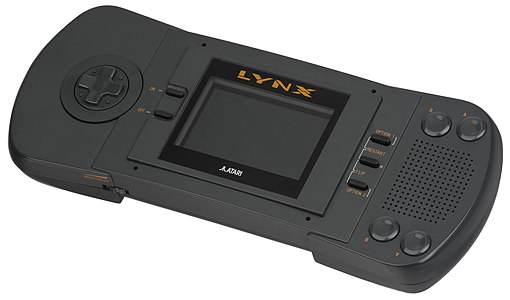History of video games/Platforms/Atari Lynx
-
The Atari Lynx handheld game console.
-
The later Atari Lynx II revision.
History
[edit | edit source]
Development
[edit | edit source]The Lynx was originally developed by a company called Epyx in August 1987 as the Handy Project, with some members of the design team having previously worked on the Amiga series of computers.[1] The system later piqued the interest of Atari,[2] which acquired it and applied it's big cat naming scheme to the device.
Launch
[edit | edit source]The Atari Lynx was launched in fall of 1989.[3][4] The launch price of the Lynx was $179.99 US Dollars.[5][2] The Lynx received a positive reception, but struggled on the market due to issues Atari faced getting retailers to carry the console.[2]A redesigned Lynx was launched in 1991 with a reduced price of $99,[5] which made it much more price competitive with the Game Boy.
Legacy
[edit | edit source]Two to three million Lynx consoles were sold.[6][4] The discontinuation date of the Lynx is disputed, with discontinuation years given of 1992,[7] 1994,[8] or 1995.[5]
The Atari Lynx gained a dedicated fanbase, and saw multiple homebrew titles released as recently as 2019.[9]
Technology
[edit | edit source]
Compared to its rivals, the Lynx had a powerful mobile computer. The handheld is powered by the Mikey CPU, a version of the 8-bit WDC 65SC02 CPU clocked at 4 megahertz and the Suzy GPU clocked at 16 megahertz.[10] Games for the Lynx could leverage a powerful graphics system, supporting hundreds of sprites, and a software defined framerate.[1] The Lynx has 64 kilobytes of RAM.[11] Lynx game cartridges could store as much as 2 megabytes of ROM.[1]
The Lynx had a color display, which was backlit,[12] permitting handheld gaming in the dark. The screen can display 4,096 colors and has a resolution of 160 pixels by 102 pixels.[1] Both a color screen and night time visibility were not universal at the time, which was a significant advantage for the Lynx.
The superior features of the Lynx required a very high power draw, and so the handheld used 6 AA batteries,[11] a significant disadvantage compared to more efficient competitors such as the Game Boy. Battery life typically lasted under 4 hours,[7] though the system could be powered by an AC adapter when near an outlet.[1] At the time, most AA batteries were non rechargeable, making operating the console a significant expense. In contrast to other handhelds of the time which were typically constrained by processor power or their display, the power consumption of the Lynx its biggest technological Achilles' Heel.
The Atari Lynx has an ambidextrous design,[4] a fairly unique choice among handheld game consoles. This made the system equally suitable for left handed or right handed gamers, though labeling does appear designed for right hand use.
Retail games for the system were packaged in cardboard boxes.[5]
Notable games
[edit | edit source]Wikipedia has a list of Atari Lynx games.
Gallery
[edit | edit source]Atari Lynx I
[edit | edit source]Atari Lynx II
[edit | edit source]Accessories
[edit | edit source]Lynx I Internals
[edit | edit source]Lynx II Internals
[edit | edit source]Developers
[edit | edit source]-
R J Mical playing a Lynx, the system he co-designed.
-
Dave Needle, one of the co-designers of the Lynx.
External Resources
[edit | edit source]- iFixit - Atari Lynx page.
References
[edit | edit source]- ↑ a b c d e "Lynx Creators - The Atari Times". web.archive.org. 16 September 2014. https://web.archive.org/web/20140916114505/http://ataritimes.com/index.php?ArticleIDX=370.
- ↑ a b c "Jack Tramiel and Family - Six Years with Atari". Day in Tech History. 17 October 2013. https://dayintechhistory.com/news/jack-tramiel-family-years-atari/.
- ↑ Parish, Jeremy (4 July 2014). "Too Powerful for Its Own Good, Atari's Lynx Remains a Favorite 25 Years Later" (in en). USgamer. https://www.usgamer.net/articles/too-good-for-its-day-ataris-lynx-remains-a-fan-favorite-25-years-later. Retrieved 25 October 2020.
- ↑ a b c "Handheld video game console:Atari Lynx Handheld Console with Case - Atari, Inc". Google Arts & Culture. Retrieved 15 November 2020.
- ↑ a b c d "Collecting The Obscure: A Look At Atari's Failed Handheld Video Game System Antiques & Auction News". antiquesandauctionnews.net. Retrieved 18 January 2021.
- ↑ "History Lesson: The consoles that 'failed'". VGC. 28 December 2019. Retrieved 1 November 2020.
- ↑ a b "Atari Lynx II (Rygar Box) - Game Console - Computing History". www.computinghistory.org.uk. Retrieved 18 January 2021.
- ↑ "Welcome to The Atari Times". www.ataritimes.com. Retrieved 18 January 2021.
- ↑ Kromin, Igor. "In 2019 we have eleven new games for the Atari Lynx | Atari Gamer" (in en). atarigamer.com. https://atarigamer.com/articles/in-2019-we-have-eleven-new-games-for-the-atari-lynx.
- ↑ "Atari Lynx". Wikipedia. 9 November 2020. Retrieved 25 November 2020.
- ↑ a b "OLD-COMPUTERS.COM : The Museum". www.old-computers.com. Retrieved 25 October 2020.
- ↑ "The Atari Lynx’s 30th birthday gift is a bunch of new games" (in en). Engadget. https://www.engadget.com/2019-08-30-atari-lynx-30-year-anniversary.html. Retrieved 25 October 2020.



























